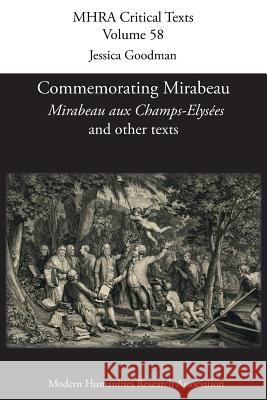Commemorating Mirabeau: 'Mirabeau aux Champs-Elysées' and other texts » książka
Commemorating Mirabeau: 'Mirabeau aux Champs-Elysées' and other texts
ISBN-13: 9781781882184 / Angielski / Miękka / 2017 / 214 str.
The death of HonorE Gabriel Riqueti, Comte de Mirabeau, on 2 April 1791, was a key moment in the early years of the French Revolution. The renowned orator, who had played a major role in drafting the DEclaration des droits de l'homme et du citoyen, succumbed to heart disease aged forty-two. His death prompted the establishment of the PanthEon, that secular temple intended to honour the great men of a new, free France. It was also the impetus for a whole range of artistic commemorative creations, including a number of plays, performed or published in the days following his death.This edition presents three such plays, all of which stage Mirabeau in conversation with other great men and women in the afterlife. It situates these texts in the memorial culture of the period, examining how they relate to other forms of commemoration, how they construct the figures of their protagonist and his companions, why their authors performed this commemorative act, and how the same genre could also subvert the celebratory tone. With an appendix containing a further two previously unpublished plays and a dossier on another lost text, this volume is an important study of the role and value of literary - and especially theatrical - commemoration in the early 1790s.
The death of Honoré Gabriel Riqueti, Comte de Mirabeau, on 2 April 1791, was a key moment in the early years of the French Revolution. The renowned orator, who had played a major role in drafting the Déclaration des droits de l’homme et du citoyen, succumbed to heart disease aged forty-two. His death prompted the establishment of the Panthéon, that secular temple intended to honour the great men of a new, free France. It was also the impetus for a whole range of artistic commemorative creations, including a number of plays, performed or published in the days following his death.This edition presents three such plays, all of which stage Mirabeau in conversation with other great men and women in the afterlife. It situates these texts in the memorial culture of the period, examining how they relate to other forms of commemoration, how they construct the figures of their protagonist and his companions, why their authors performed this commemorative act, and how the same genre could also subvert the celebratory tone. With an appendix containing a further two previously unpublished plays and a dossier on another lost text, this volume is an important study of the role and value of literary – and especially theatrical – commemoration in the early 1790s.











